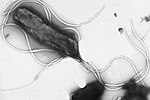Portal:Medicine/Selected article/23, 2006

Helicobacter pylori is a bacterium that infects the mucus lining of the human stomach. Many peptic ulcers and some types of gastritis are caused by H. pylori infection, although most humans who are infected will never develop symptoms. This bacterium lives in the human stomach exclusively and is the only known organism that can thrive in that highly acidic environment. It is helix-shaped (hence the name helicobacter) and can literally screw itself into the stomach lining to colonize.
The bacterium was rediscovered in 1982 by two Australian scientists Robin Warren and Barry Marshall; they isolated the organisms from mucosal specimens from human stomachs and were the first to successfully culture them. In their original paper, Warren and Marshall contended that most stomach ulcers and gastritis were caused by colonization with this bacterium, not by stress or spicy food as had been assumed before. Read more...
